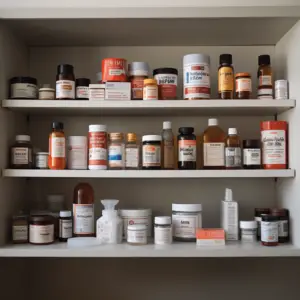Panacur Medication, granules should be stored in a firmly sealed container at room temperature and out of direct sunlight.
To avoid accidents, Panacur must be stored away from children and pets and carefully labeled.
If your dog needs Panacur, your vet may suspend it. This suspension is sensitive and needs proper storage to avoid combination changes that could render it ineffective.
Table of Contents
So, Does Panacur need to be refrigerated?

Your veterinarian will give you the specific instructions regarding storage but often, in this form, Panacur suspension needs to be refrigerated.
What is Panacur?
Panacur, which also goes by the name Panacur C is a deworming medication commonly used to treat worms in dogs but is also effective when administered for the same reason in cats, horses, rabbits, cattle, sheep, and fish though in some of these cases the usage may be ‘off-label’.
The active ingredient in Panacur is fenbendazole which is a broad-spectrum anthelmintic or antiparasitic that is very effective against gastrointestinal worm infestations such as roundworms, whipworms, hookworms, tapeworms giardia, pinworms, strongyles, strongyloides, paragonimiasis and aelurostrongylus among others.
Fenbendazole functions by disabling, stunning, sterilizing, denaturing, or killing parasites and forcing them out of the gastrointestinal tract through the feces.
Without worms, your dog’s stool will indicate a lot of parasites within 24 hours of Panacur administration if the dose is completed according to your doctor’s schedule.
Panacur C is almost 100% effective against roundworms, hookworms, and whipworms. It has a 73% – 75% efficacy rating against tapeworm (Taenia pisiformis), but it has no effect on Dipylidium caninum which is the most common type of tapeworm that afflicts dogs.
How is Panacur administered?
Panacur granules are used in dog food. Granules should be mixed with a little meal to achieve proper absorption. After eating, add more.
Panacur Medication can be taken as a paste or a suspension with a needleless syringe. All dogs should take Panacur with or after food. Because the liver and stomach absorb Panacur poorly. Deworming your dog with Panacur can dehydrate him, so give him lots of water.
What is the right dosage for Panacur?
The specifics of the dosage depend on the dog and in some cases the severity of the parasitic infestation may provide for a different dosage but in general, your dog’s weight should be a sufficient variable in determining the right dosage.
Give 50 mg for every kilogram of body weight or 22.7 mg per pound of body weight.
This dosage should be repeated for three days minimum. A serious infestation may require a five-day treatment, although your veterinarian should caution against overdose or toxicity.
This can be quite uncomfortable for the dog not to mention the unnecessary suffering and side effects that may come with administering the dose longer than is necessary.
Can puppies take Panacur?
Puppies under six weeks of age should not have Panacur administered.
Puppies may have an adverse reaction and even if it does no harm, Panacur may be useless. Often, puppies this young are unlikely to have contracted a parasitic infestation.
Due to their limited environmental interaction and breastfeeding, they are protected by their mother’s antibodies in breast milk.
After weaning or eight weeks, they can receive Panacur cautiously based on their size and weight. You must be mindful of reactions and allergies since the drug is new to the puppies.
Beyond six months of age, deworm your dog or dogs twice a year.
What are the side effects of Panacur?
Panacur is one of the safest antiparasitics for dogs and allergic reactions are very rare.
Most dogs barely react to Panacur but some slight discomfiture may be noted particularly within the first 24 hours just like in most humans. The following are some side effects of Panacur:
- Nausea
- Vomiting
- Lethargy and fatigue
- Loose stool or mild diarrhea
- A loss of appetite
- Unusual behavior that may be a reaction to dying parasites such as irritability
These are no cause for concern but if they persist or get worse past the 48-hour mark, consult a veterinarian since this is abnormal and may be an indicator that your dog is allergic to Panacur.
When should Panacur not be administered?

Do not give Panacur if your dog is:
- Allergic
- Under six weeks of age
- Pregnant
- Lactating
- Under other medication that could cause an adverse reaction
- Suffering an unknown condition
- Under ten pounds in weight
It is recommended to consult your vet for the first ever dose your dog takes. After that, you can administer Panacur independently. It should be safe.
In fact, this is best practice and you will not need any further advice unless a specific issue arises since Panacur is an over-the-counter drug.
Can dogs overdose on Panacur?
Panacur Medication is very unlikely that you can overdose your dog since fenbendazole does not appear to have much affinity for interacting with gut tissue.
However, if Panacur is stored carelessly where the dog can accidentally access it, ingesting excessive amounts can definitely harm your dog. If this happens it is crucial to consult a vet to have your dog pumped.
Overdoses resulting from miscalculations in the dosage needed for your dog usually have no lasting effects and the drug should come out of the dog’s system within the days following the ingestion of the drug.


